English chronicle from the 16th century. 1550 is an approximation.
Quote Category: Work
There are many different concepts and kinds of work. Traditionally, many of these have contributed to people’s livelihoods, for example, wage labour, housework, subsistence work and care work.
However, there are also other kinds of work such as slave labour and forced labour in which the death of workers is either tolerated or actively planned. The cynical slogan that was used in National Socialist Germany, “work sets you free,” captures the latter.
In Protestant societies in particular, the concept of work stretches beyond livelihood to become an end in itself.
This timeline addresses the following questions:
* Who benefits from work and when?
* What examples are there of forced labour?
* When was work characterised as a virtue and by whom?
* How does the dominant concept of work relate to the view that poverty is self-inflicted?
* What historical events and interests contributed to this view?
* What are the links between work, capitalism, class, racism and sexism?
* How were ways of life that did not conform to the Protestant work ethic devalued?
* Which values are associated with which types of work?
* What are some examples of resistance and alternatives to dominant concepts of work?
Unfortunately wrong answer
Try again!
The answer was
Read the solution on the "line with the dots" (there where you can re-read all the quotes)
OK
The peasant knaves be too wealthy (…) they know no obedience, they regard no laws, they would have no gentlemen. (…) They will appoint us what rent we shall take for our grounds.
Correct!
The peasant knaves be too wealthy (…) they know no obedience, they regard no laws, they would have no gentlemen. (…) They will appoint us what rent we shall take for our grounds.
Year:
Author Bio:
Source:
Quote: R. H. Tawney and Eileen Power (1924): “Tudor Economic Documents,” London, vol. iii, p. 58 (spelling modernised) quoted by Christopfer Dyer (1968): “A Redistribution of Incomes in Fifteenth-Century England?” In Past & Present, No. 39, Oxford University Press, p. 33.
Picture: Spartacus Educational
Context:
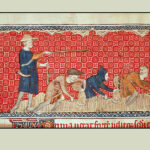 In the 14th century in particular, there were revolts all across Europe against the church and nobility – who forced farmers to work as serfs. This resistance was, however, weakened by the great plagues (Federici, 2014: 55). Poor people were particularly vulnerable. Yet because of the plagues and the feeling of imminent death they generated, many serfs no longer saw any point in working so hard. In addition, the great plague epidemic from 1346 to 1353 (which killed a third of Europe’s population) also led to a labour shortage. This enabled surviving farmers and serfs to demand better working and living conditions from their masters, who, as in the quote, complained about this new self-confidence.
In the 14th century in particular, there were revolts all across Europe against the church and nobility – who forced farmers to work as serfs. This resistance was, however, weakened by the great plagues (Federici, 2014: 55). Poor people were particularly vulnerable. Yet because of the plagues and the feeling of imminent death they generated, many serfs no longer saw any point in working so hard. In addition, the great plague epidemic from 1346 to 1353 (which killed a third of Europe’s population) also led to a labour shortage. This enabled surviving farmers and serfs to demand better working and living conditions from their masters, who, as in the quote, complained about this new self-confidence.
Further Reading:
*Silvia Federici (2014): Caliban and the Witch. Women, the Body and Primitive Accumulation. New York: Autonomedia.
*Juliet B. Schor (1991): The Overworked American: The Unexpected Decline of Leisure. New York: Basic Books.
OK
White Man’s work eat people.
Correct!
White Man’s work eat people.
Year:
Author Bio:
Mossi proverb from what was then Upper Volta and is today Burkina Faso.
Source:
Quote: John C. Caldwell (1990): The Social Repercussions of Colonial Rule: Demographic Ascpects. In: Albert Adu Boahen (Hrsg): General History of Africa. VII. Africa under Colonial Domination 1880-1935. London: Heinemann, p. 475. The year (1900) is an approximation.
Picture: Wikimedia
Context:
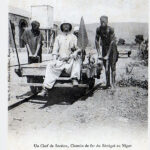 Enslaved Africans were forced to work on colonisers’ plantations and infrastructure projects (Linebaugh and Rediker, 2008: 16, German edition). For example, in the early 20th century, before WW1, one fifth of the ‘workforce’ in the German colony of Cameroon (150 to 200 people of every 1000, see Caldwell, 1990) died of the hardships and diseases of plantation and railway construction work. This high mortality rate was also at the root of the Mossi proverb in today’s Burkina Faso.
Enslaved Africans were forced to work on colonisers’ plantations and infrastructure projects (Linebaugh and Rediker, 2008: 16, German edition). For example, in the early 20th century, before WW1, one fifth of the ‘workforce’ in the German colony of Cameroon (150 to 200 people of every 1000, see Caldwell, 1990) died of the hardships and diseases of plantation and railway construction work. This high mortality rate was also at the root of the Mossi proverb in today’s Burkina Faso.
Further Reading:
*John C. Caldwell (1990): The social repercussions of colonial rule: demographic ascpects. In: Albert Adu Boahen (Hrsg): General History of Africa. VII. Africa under Colonial Domination 1880-1935. London: Heinemann, S. 458-486.
*Peter Linebaugh & Marcus Rediker (2000): The Many-headed Hydra. New York: Verso.
OK
There’s class warfare, all right, but it’s my class, the rich class, that’s making war, and we’re winning.
Correct!
There’s class warfare, all right, but it’s my class, the rich class, that’s making war, and we’re winning.
Year:
Author Bio:
Warren Buffett (born 1930) is a US American entrepreneur, investor, and multi-billionaire.
Source:
Zitat: Ben Stein (26.11.2006): In Class Warfare, Guess Which Class Is Winning. In: New York Times.
Bild: www.saha.org.za/udf/full/671.jpg
Context:
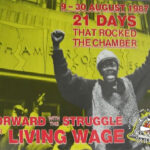 For Buffet, war is about the distribution of economic resources. Since the 19th century, workers’ movements in many parts of the world have been fighting for their social and economic rights, for example, the 8 hour work day which was established in Germany in 1918. However, from the 1980s onwards, social rights have been cut back across the world, to the benefit of the rich. US President Ronald Reagan and Prime Minister Margaret Thatcher in the UK were crucial protagonists here. Thatcher smashed the unions, describing striking miners in 1984 as the ‘enemy within’. Sociologist Wilhelm Heitmeyer also talked about a ‘class struggle from above’ in the case of Germany. Yet this struggle was confronted with many forms of resistance. In 1987, more than 300,000 black miners organised a strike in apartheid controlled South Africa, which was violently suppressed.
For Buffet, war is about the distribution of economic resources. Since the 19th century, workers’ movements in many parts of the world have been fighting for their social and economic rights, for example, the 8 hour work day which was established in Germany in 1918. However, from the 1980s onwards, social rights have been cut back across the world, to the benefit of the rich. US President Ronald Reagan and Prime Minister Margaret Thatcher in the UK were crucial protagonists here. Thatcher smashed the unions, describing striking miners in 1984 as the ‘enemy within’. Sociologist Wilhelm Heitmeyer also talked about a ‘class struggle from above’ in the case of Germany. Yet this struggle was confronted with many forms of resistance. In 1987, more than 300,000 black miners organised a strike in apartheid controlled South Africa, which was violently suppressed.
Further Reading:
*New York Times (16.08.1987): Miners’ Strike in South Africa Raises the Spirit of Resistance
OK
Under no circumstances whatsoever should it be permitted to occur that a peasant, who has paid his taxes and other legally required obligations, should be left with nothing to do. The moral authority of the administrator, persuasion, encouragement and other measures should be adopted to make the native work.
Correct!
Under no circumstances whatsoever should it be permitted to occur that a peasant, who has paid his taxes and other legally required obligations, should be left with nothing to do. The moral authority of the administrator, persuasion, encouragement and other measures should be adopted to make the native work.
Year:
Author Bio:
Annual report of the Governor General of the Belgian colony of the Congo.
Source:
Nzula et al. 1979 quoted in Henry Bernstein (2000): “Colonialism, Capitalism, Development.” In: Tim Allen and Alan Thomas (Eds): Poverty and Development into the 21st Century. Oxford: Oxford University Press, p. 264.
Context:
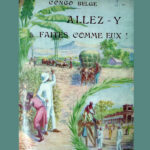 European colonies in Africa, Asia and Latin America economically exploited people and their labour, together with nature and its resources. In addition to direct enslavement and the compulsion to work (e.g. through the introduction of taxes), colonisers always tried to morally justify forced labour, e.g. as character forming. Still today, many people are forced into quasi-slave labour, both in Europe (e.g. 145.000 people in Italy in 2016, GSI) as well as in Asia (e.g. 3, 8 million people in China in 2016, GSI). Conditions in US prisons are also dire. For example, working conditions
European colonies in Africa, Asia and Latin America economically exploited people and their labour, together with nature and its resources. In addition to direct enslavement and the compulsion to work (e.g. through the introduction of taxes), colonisers always tried to morally justify forced labour, e.g. as character forming. Still today, many people are forced into quasi-slave labour, both in Europe (e.g. 145.000 people in Italy in 2016, GSI) as well as in Asia (e.g. 3, 8 million people in China in 2016, GSI). Conditions in US prisons are also dire. For example, working conditions
for inmates in the former Louisiana plantation known today as “Anglola”
are little better than slave labour (peopeoplesworld.org, May 4th, 2018).
Further Reading:
*Henry Bernstein (2000): Colonialism, Capitalism, Development. In: Tim Allen / Alan Thomas (Hrsg.): Poverty and Development into the 21st Century. Oxford: Oxford University Press, S. 241–270.
*GSI Global Slavery Index (2016): Country reports
OK
Anyone who moves about without work or a job, without being able to prove that he has the means to support himself or is looking for an opportunity to do so, must be imprisoned for at least six weeks or made to do forced labour for up to six months. After the punishment is over, foreigners are to be expelled from the country and nationals to be taken to a corrections facility.
Correct!
Anyone who moves about without work or a job, without being able to prove that he has the means to support himself or is looking for an opportunity to do so, must be imprisoned for at least six weeks or made to do forced labour for up to six months. After the punishment is over, foreigners are to be expelled from the country and nationals to be taken to a corrections facility.
Year:
Author Bio:
Prussian Law on the Punishment of Vagrants (Prussia was a former German state).
Source:
Quote: Law on the Punishment of Vagrants, Beggars and the Work-shy. From January 6, 1843. In: Law Collection for the Royal Prussian States 1843. Berlin: Law Collection Office, p. 19.
Picture: Wikimedia
Context:
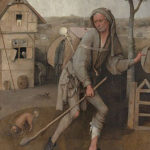 The Prussian Law on the Punishment of Vagrants, Beggars and the Work Shy legalised the imprisonment of homeless people in work houses. The peak of discrimination against those without recognised jobs or homes was reached during the Nazi era. In 1933, the persecution, detention and murder of so-called ‘work shy’ and ‘anti-social’ people began.
The Prussian Law on the Punishment of Vagrants, Beggars and the Work Shy legalised the imprisonment of homeless people in work houses. The peak of discrimination against those without recognised jobs or homes was reached during the Nazi era. In 1933, the persecution, detention and murder of so-called ‘work shy’ and ‘anti-social’ people began.
Further Reading:
*Peter Linebaugh & Marcus Rediker (2000): The Many-headed Hydra. New York: Verso. Chapter 2.
OK
If you don’t work, you shouldn’t eat (…). Only those who work should eat.
Correct!
If you don’t work, you shouldn’t eat (…). Only those who work should eat.
Year:
Author Bio:
Franz Müntefering (born 1940) is a German Social Democrat. From 2005 to 2007 he was Vice Chancellor and Federal Minister of Labour and Social Affairs.
Source:
Quote: Katharina Schuler (11.01.2010): Hartz IV: Arbeiten fürs Essen. In: Die ZEIT.
Picture: Wikimedia
Context:
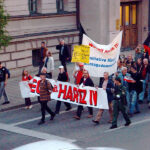 With the introduction of a new unemployment benefit (Arbeitslosengeld II, also called Hartz IV) in Germany, many unemployed people were exposed to severe control and repression. According to the unemployed workers’ initiative Basta!, the widespread ‘lie of the lazy unemployed’ plays into the hands of those who benefit from underpaid work on the one hand, and the intensification of everyday work on the other.
With the introduction of a new unemployment benefit (Arbeitslosengeld II, also called Hartz IV) in Germany, many unemployed people were exposed to severe control and repression. According to the unemployed workers’ initiative Basta!, the widespread ‘lie of the lazy unemployed’ plays into the hands of those who benefit from underpaid work on the one hand, and the intensification of everyday work on the other.
Further Reading:
*Wilhelm Heitmeyer; Kirsten Edrikat (2008): Die Ökonomisierung des Sozialen. Folgen für „Überflüssige“ und „Nutzlose“. In: Wilhelm Heitmeyer (Hrsg.): Deutsche Zustände, Band 6, S. 55-72.
*Guardian (01.01.2013): „’Hartz reforms’: how a benefits shakeup changed Germany“
OK
Whereas, it has become evident through long experience that nothing has sufficed to bring the said chiefs and I* to a knowledge of our Faith (necessary for their salvation), since by nature they are inclined to idleness and vice, and have no manner of virtue or doctrine (by which Our Lord is disserved). (…) at the time the I* go to serve them [the Spaniards] they are indoctrinated in and taught the things of our Faith, after serving they return to their dwellings where, because of the distance and their own evil inclinations, they immediately forget what they have been taught and go back to their customary idleness and vice.
Correct!
Whereas, it has become evident through long experience that nothing has sufficed to bring the said chiefs and I* to a knowledge of our Faith (necessary for their salvation), since by nature they are inclined to idleness and vice, and have no manner of virtue or doctrine (by which Our Lord is disserved). (…) at the time the I* go to serve them [the Spaniards] they are indoctrinated in and taught the things of our Faith, after serving they return to their dwellings where, because of the distance and their own evil inclinations, they immediately forget what they have been taught and go back to their customary idleness and vice.
Year:
Author Bio:
Excerpt from the Burgos Laws through which the Spanish Crown regulated the behaviour of Spaniards towards the colonised peoples of the Caribbean.
Source:
Quote: Southern Methodist University, 1512-1513. Gesetze von Burgos.
Picture: Wikimedia
Context:
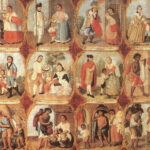 There were strict hierarchies in the Spanish colonies in America. For example, the Burgos Laws of 1512/1513 stipulated that the indigenous peoples of the Americas were subject to Spanish feudal lords, but should not be considered slaves. In order to exploit them as workers, the Spanish crown meticulously regulated their working and living conditions. They wanted to make sure that they would not reproduce their own ways life and at the same time would not be subjected to excessive violence by feudal lords. However, by 1550, 50-90 percent of the estimated 80 to 100 million inhabitants of Latin America had been killed by warfare, enslavement and diseases (National Geographics 2011 & The Guardian 2019).
There were strict hierarchies in the Spanish colonies in America. For example, the Burgos Laws of 1512/1513 stipulated that the indigenous peoples of the Americas were subject to Spanish feudal lords, but should not be considered slaves. In order to exploit them as workers, the Spanish crown meticulously regulated their working and living conditions. They wanted to make sure that they would not reproduce their own ways life and at the same time would not be subjected to excessive violence by feudal lords. However, by 1550, 50-90 percent of the estimated 80 to 100 million inhabitants of Latin America had been killed by warfare, enslavement and diseases (National Geographics 2011 & The Guardian 2019).
Further Reading:
*Eduardo Galeano (1973): Open Veins of Latin America. Five centuries of the pillage of a continent. New York: Monthly Review Press.
*National Geographic (06.12.2011): “Massive Population Drop Found for Native Americans, DNA Shows”
*The Guardian (31.01.2019): “European colonization of Americas killed so many it cooled Earth’s climate“
OK
Turkish people’s supposed “work ethic” satisfied the economy’s demands: they were viewed as young, strong, unskilled, disciplined and passive, or, as it says in the correspondence between a local authority and the German Federal Employment Agency, ‘the Turk (…) if he is handled correctly, can be integrated and exploited.’
Correct!
Turkish people’s supposed “work ethic” satisfied the economy’s demands: they were viewed as young, strong, unskilled, disciplined and passive, or, as it says in the correspondence between a local authority and the German Federal Employment Agency, ‘the Turk (…) if he is handled correctly, can be integrated and exploited.’
Year:
Author Bio:
Employee of the Westphalian-Lippian Landscape Association which oversees social and youth work as well as assistance for people with special needs.
Source:
Quote: Jörg Huwer (2014): Gastarbeiter im Streik. Die Arbeitsniederlegung bei Ford Köln im August 1973. Köln: DOMiD, p. 23.
Picture: Ford73 Blogspot
Context:
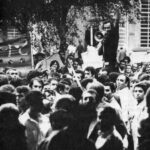 The booming West-German post-war economy needed workers, but did not want to pay high wages. German politics and business argued that workers from southern Europe and North Africa could get paid less. And because they had no collective bargaining agreements, so they did not have the same employment rights. The quote shows how workers were characterised during the 20th century (with no mention of structural descrimination, they were constructede as deficient individuals, Türkmen, 2017: 50). Increasingly, however, these workers organised themselves. In 1973, 6,000 Turkish workers at Ford in Cologne went out on a ‘wildcat strike’ which was sparked by strict vacation regulations. The strike was defeated, amongst other things, by thugs hired by factory management (Betriebszelle Ford, 1973: 68).
The booming West-German post-war economy needed workers, but did not want to pay high wages. German politics and business argued that workers from southern Europe and North Africa could get paid less. And because they had no collective bargaining agreements, so they did not have the same employment rights. The quote shows how workers were characterised during the 20th century (with no mention of structural descrimination, they were constructede as deficient individuals, Türkmen, 2017: 50). Increasingly, however, these workers organised themselves. In 1973, 6,000 Turkish workers at Ford in Cologne went out on a ‘wildcat strike’ which was sparked by strict vacation regulations. The strike was defeated, amongst other things, by thugs hired by factory management (Betriebszelle Ford, 1973: 68).
Further Reading:
*Transversal (10/2017): “Lotta Continua in Frankfurt, Terror of Turks in Cologne. Migrant Struggles in the History of the Federal Republic of Germany.”
*Ceren Türkmen (2017). Gastarbeitsgeschichte zwischen Migrationsregime, Staat und kommunaler Befreiung. Methoden zur Wissensproduktion, Material & Machtkritik. In glokal: Connecting the Dots. Lernen aus Geschichte(n) zu Unterdrückung und Widerstand.
*Betriebszelle Ford der Gruppe Arbeiterkamps (1973): Streik bei Ford Köln.
OK
Always spinning sheets of silk/We shall never be better dressed/But always naked and poor/And always suffering hunger and thirst.
Correct!
Always spinning sheets of silk/We shall never be better dressed/But always naked and poor/And always suffering hunger and thirst.
Year:
Author Bio:
French song by women silk-spinning workers describing their poverty.
Source:
Quote: Quoted in Bronislaw Geremek (1985): Poverty. A History. Oxford: Basil Blackwell, p. 65.
Picture: Wikimedia
Context:
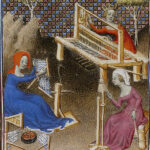 As Silvia Federici (2014: 52) writes, and as records from French city archives show, most of society tended to associate women wage earners with prostitution. Federici suspects that this was because of their independence: many weavers lived alone, often in great poverty. Today, the work of textile workers, especially in the Global South, is still characterised by extreme exploitation, and 80% of them are women (Clean Clothes Campaign 2020). According to a study by the Clean Clothes Campain and Fashionchecker, of the 108 companies they examined, 93% did not pay a living wage (Fashion Checker 2020).
As Silvia Federici (2014: 52) writes, and as records from French city archives show, most of society tended to associate women wage earners with prostitution. Federici suspects that this was because of their independence: many weavers lived alone, often in great poverty. Today, the work of textile workers, especially in the Global South, is still characterised by extreme exploitation, and 80% of them are women (Clean Clothes Campaign 2020). According to a study by the Clean Clothes Campain and Fashionchecker, of the 108 companies they examined, 93% did not pay a living wage (Fashion Checker 2020).
Some historical sources show that women workers were by no means a rarity. For example, between 1300 and 1500, women were represented in 200 professions in Frankfurt. In the 14th century the city of Frankfurt employed 16 women doctors, some of them even as surgeons. The banishment of women to domestic professions did not take place until centuries later (Federici 2014: 37).
Further Reading:
*Silvia Federici (2014): Caliban and the Witch. Women, the Body and Primitive Accumulation. New York: Autonomedia.
OK
Surplus from Africa was partly used to offer a few more benefits to European workers and served as a bribe to make the latter less revolutionary. The bribe came in the form of increased wages, better working conditions, and expanded social services. The benefits of colonialism were diffused throughout European society in many ways. (…) Meanwhile, the capitalist still made his fortune by ensuring that the Ivory Coast or Colombian grower got no
price increases.
Correct!
Surplus from Africa was partly used to offer a few more benefits to European workers and served as a bribe to make the latter less revolutionary. The bribe came in the form of increased wages, better working conditions, and expanded social services. The benefits of colonialism were diffused throughout European society in many ways. (…) Meanwhile, the capitalist still made his fortune by ensuring that the Ivory Coast or Colombian grower got no
price increases.
Year:
Author Bio:
Walter Rodney (1942-1980) was a Marxist historian and politician from Guyana. Born into a working-class family, he studied in Guyana and Jamaica and taught in Germany and Tanzania. He was killed in a bomb attack in 1980 while campaigning for the Working People’s Alliance election campaign. In 2015, a commission of inquiry found that the attack had originated from within the Guyanese government.
Source:
Quote: Walter Rodney (1975): Afrika. Die Geschichte einer Unterentwicklung. Berlin: Klaus Wagenbach, p. 173, German edition.
Picture: Wikimedia
Context:
 The main beneficiaries of colonial conquest and plunder were European companies and colonial states. In addition, both the resources that were stolen from colonised areas and the exploitation of their people helped to defuse conflicts between labour and capital in the metropolises. There, the working classes were given a share of colonial exploitation through, for example, the cheap availability of consumer goods such as sugar and coffee. This encouraged the European working class to show solidarity with the ruling class in their own country rather than with the dispossessed on other continents. In order to achieve this cross-class “solidarity”, discourses of racism and national unity were also deployed, especially from the 19th century onwards.
The main beneficiaries of colonial conquest and plunder were European companies and colonial states. In addition, both the resources that were stolen from colonised areas and the exploitation of their people helped to defuse conflicts between labour and capital in the metropolises. There, the working classes were given a share of colonial exploitation through, for example, the cheap availability of consumer goods such as sugar and coffee. This encouraged the European working class to show solidarity with the ruling class in their own country rather than with the dispossessed on other continents. In order to achieve this cross-class “solidarity”, discourses of racism and national unity were also deployed, especially from the 19th century onwards.
Further Reading:
*Walter Rodney (1973): How Europe Underdeveloped Africa. London: Bogle-L’Ouverture Publications & Dar-Es-Salaam: Tanzanian Publishing House.
*Benedict Anderson (1983): Imagined Communities. Reflections on the Origins and Spread of Nationalism. London & New York: Verso.
OK
The greatest difficulty with our boys is to overcome their innate aversion to work. You have to know that they are the children of born beggars.
Correct!
The greatest difficulty with our boys is to overcome their innate aversion to work. You have to know that they are the children of born beggars.
Year:
Author Bio:
Anonymous priest who evangelised among the Lakota Sioux in North America about his pupils.
Source:
Quote: Jasmin Lörchner (23.11.2016): Wie die Sioux katholisch wurden. In: Spiegel Online. The year (1900) is an approximation.
Picture: Wikimedia
Context:
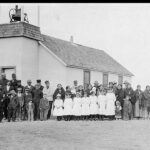 Lakota spirituality was fundamentally different from Christianity. They believed that they only thrived thanks to nature’s benevolence and did not consider humans to be the pinnacle of creation. Sitting Bull and many others protested against the confinement of the Sioux (to which the Lakota belong) in reservations, and against living conditions in them. The Sioux also rejected attempts to forcibly assimilate them, as well as Christianity – missionary work was brutal and involved in the colonial subjugation and exploitation of Native Americans.
Lakota spirituality was fundamentally different from Christianity. They believed that they only thrived thanks to nature’s benevolence and did not consider humans to be the pinnacle of creation. Sitting Bull and many others protested against the confinement of the Sioux (to which the Lakota belong) in reservations, and against living conditions in them. The Sioux also rejected attempts to forcibly assimilate them, as well as Christianity – missionary work was brutal and involved in the colonial subjugation and exploitation of Native Americans.
Further Reading:
*MariJo Moore (2003): Genocide of the Mind. New Native American Writing. New York: Nation Books.
OK
The [witch] is gone now (…) [but] her fears, and the forces she struggles against in her lifetime, live on. We can open our newspapers, and read the same charges against the idle poor (…). The expropriators move into the Third World, destroying cultures (…) plundering the resources of land and people (…) If we turn on the radio, we can hear the crackle of flames (…) But the struggle also lives on.
Correct!
The [witch] is gone now (…) [but] her fears, and the forces she struggles against in her lifetime, live on. We can open our newspapers, and read the same charges against the idle poor (…). The expropriators move into the Third World, destroying cultures (…) plundering the resources of land and people (…) If we turn on the radio, we can hear the crackle of flames (…) But the struggle also lives on.
Year:
Author Bio:
Starhawk (born 1951 as Miriam Simos) is an US American writer and activist. She writes feminist non-fiction books that centre on goddess religions.
Source:
Quote: Silvia Federici (2014: 208).
Picture: Wikimedia. The picture from 1880 shows Elisabeth Plainacher who was executed as an alleged in 1583 in Vienna.
Context:
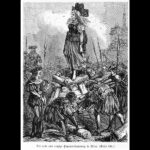 Starhawk is referring to the persecution of women as witches in the context of capitalism’s seizure of the commons in Europe, which began in the 14th century. She sees parallels between on the one hand, the devaluation in Europe of women’s ways of life, work and knowledge during capitalism’s rise, and on the other, the categorisation as inferior of societies in the Global South, as well of poor people today. Resistance by these actors has always stood in the way of capitalist exploitation of humans and nature.
Starhawk is referring to the persecution of women as witches in the context of capitalism’s seizure of the commons in Europe, which began in the 14th century. She sees parallels between on the one hand, the devaluation in Europe of women’s ways of life, work and knowledge during capitalism’s rise, and on the other, the categorisation as inferior of societies in the Global South, as well of poor people today. Resistance by these actors has always stood in the way of capitalist exploitation of humans and nature.
Further Reading:
Silvia Federici (2014): Caliban and the Witch. Women, the Body and Primitive Accumulation. New York: Autonomedia.
OK
Spaniards should not only help alleviate the general shortage of people; they should above all relieve the many women on whom the Post [German Federal Mail] has had to rely for months. Of the 1700 core Post Office staff, more than half – exactly 900 – are female. Chief Post Office Director Kröpf: ‘Our work is often very hard and we shouldn’t let this harm women. This is where the Spaniards are to step in – primarily in the loading service at the train station.’
Correct!
Spaniards should not only help alleviate the general shortage of people; they should above all relieve the many women on whom the Post [German Federal Mail] has had to rely for months. Of the 1700 core Post Office staff, more than half – exactly 900 – are female. Chief Post Office Director Kröpf: ‘Our work is often very hard and we shouldn’t let this harm women. This is where the Spaniards are to step in – primarily in the loading service at the train station.’
Year:
Author Bio:
Unknown journalist for the German daily newspaper Rheinische Post.
Source:
Quote: Quoted by Ceren Turkmen. Original source: Local daily newspaper: Rheinische Post from November 16, 1962. Without page indication.
Picture: pics.de
Context:
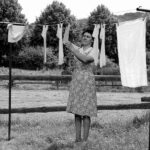 The history of the “Gastarbeiter” (migrant worker) discourse has been told mostly through dominant sources, as in this quote from the Rheinische Post, which emphasizes the poor German language skills of migrants workers. It also represents an attitude that was widespread in West Germany in the 1960s: that German women should not pursue waged work. While there has been resistance from migrants since the beginning of “guest worker recruitment” (e.g. the strike at the Ford factory in Cologne in 1973), criticism from migrant workers started to be “heard“ by dominant society only in the last two decades (e.g. with Feridun Zaimoğlu’s book Kanak Sprak from 1995).
The history of the “Gastarbeiter” (migrant worker) discourse has been told mostly through dominant sources, as in this quote from the Rheinische Post, which emphasizes the poor German language skills of migrants workers. It also represents an attitude that was widespread in West Germany in the 1960s: that German women should not pursue waged work. While there has been resistance from migrants since the beginning of “guest worker recruitment” (e.g. the strike at the Ford factory in Cologne in 1973), criticism from migrant workers started to be “heard“ by dominant society only in the last two decades (e.g. with Feridun Zaimoğlu’s book Kanak Sprak from 1995).
Further Reading:
*Ceren Türkmen (2017). Gastarbeitsgeschichte zwischen Migrationsregime, Staat und kommunaler Befreiung. In glokal: Connecting the Dots. Lernen aus Geschichte(n) zu Unterdrückung und Widerstand.
*Tom Cheesman (2003): Akçam – Zaimoğlu –‘Kanak Attak’: Turkish Lives and Letters in German. In: German Life and Letters 55(2): p. 180 – 195
OK
Work never killed anybody, but through idleness people loose life and limb, because man was born to work like a bird was born to fly.
Correct!
Work never killed anybody, but through idleness people loose life and limb, because man was born to work like a bird was born to fly.
Year:
Author Bio:
Martin Luther (1483-1546) was a German monk and professor of theology. He was the most important figure in the Reformation which challenged the power of the Catholic Church.
Source:
Quote: Heinz-Josef Bontrup (2009): Arbeit und Kapital. Wirtschaftspolitische Bestandsaufnahme und Alternativen. In: Johannes Rehm / Hans G. Ulrich (Hrsg.): Menschenrecht auf Arbeit? Sozialethische Perspektiven, Stuttgart: Kohlhammer, p. 164.
Picture: Wikimedia.
Context:
 Luther saw work as a form of service, stressing that both secular and spiritual professions were of equal value. Over the following centuries, the Protestant conception of work served as one of the ideological arguments for justifying the imprisonment in workhouses of those not considered hardworking. In Calvinism in particular, property and wealth were viewed as signs of divine pleasure. In The Protestant Ethic and the Spirit of Capitalism (1904/1905), the sociologist Max Weber described the close connection between the Protestant work ethic and capitalism.
Luther saw work as a form of service, stressing that both secular and spiritual professions were of equal value. Over the following centuries, the Protestant conception of work served as one of the ideological arguments for justifying the imprisonment in workhouses of those not considered hardworking. In Calvinism in particular, property and wealth were viewed as signs of divine pleasure. In The Protestant Ethic and the Spirit of Capitalism (1904/1905), the sociologist Max Weber described the close connection between the Protestant work ethic and capitalism.
Further Reading:
*BBC (27.03.2014): In Our Time. Weber’s The Protestant Ethic.
OK
For sale, a prime lot of Gypsy slaves, to be sold by auction at the Monastery of St. Elias, 8 May 1852, consisting of 18 men, 10 boys, 7 women and 3 girls: in fine condition.
Correct!
For sale, a prime lot of Gypsy slaves, to be sold by auction at the Monastery of St. Elias, 8 May 1852, consisting of 18 men, 10 boys, 7 women and 3 girls: in fine condition.
Year:
Author Bio:
Ian Hancock (born 1942), who is Romani, researched this quote from 1852. In 1971 he was awarded a PhD despite not having a high school diploma. He subsequently became a professor at the University of Texas and opened the Romani Archive and Documentation Centre, which contains over 10,000 titles on the subject of Rrom*nja and Sinte*zza. His book The Pariah Syndrome is one of the few to provide a historical account of Romanian Rrom*nja slavery.
Source:
Quote: Ian Hancock (1987): The Pariah Syndrome. An Account of Gypsy Slavery Tucson: Karoma Pub.
Picture: ORF
Context:
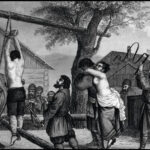 While slavery had been forbidden in Europe since the early Middle Ages, the serf system (Federici, 2014: 27) continued to exist. The fact that 14th century Romanian chronicles first mention Romn*ja as “objects” in monasteries suggests another reality: that both the royal family and nobility enslaved them. Even in monasteries, one could find enslaved Romn*ja working in different professions, as blacksmiths, miners, cooks, field workers or musicians.
While slavery had been forbidden in Europe since the early Middle Ages, the serf system (Federici, 2014: 27) continued to exist. The fact that 14th century Romanian chronicles first mention Romn*ja as “objects” in monasteries suggests another reality: that both the royal family and nobility enslaved them. Even in monasteries, one could find enslaved Romn*ja working in different professions, as blacksmiths, miners, cooks, field workers or musicians.
Further Reading:
*Silvia Federici (2014): Caliban and the Witch. Women, the Body and Primitive Accumulation. New York: Autonomedia.
OK
The Devel was in the English-man, that he makes every thing work; he makes the Negro work, the Horse work, the Ass work, the Wood work, the Water work, and the Winde work.
Correct!
The Devel was in the English-man, that he makes every thing work; he makes the Negro work, the Horse work, the Ass work, the Wood work, the Water work, and the Winde work.
Year:
Author Bio:
Anonymous enslaved person in Barbados.
Source:
Quote: Anonym (1676): Great Newes from the Barbadoes, Or, A True and Faithful Account of the Grand Conspiracy of the Negroes against the English and the Happy Discovery of the Same with the Number of Those That Were Burned Alive, Beheaded, and Otherwise Executed for Their Horrid Crimes. With a Short Discription of That Plantation. London: L. Curtis, p. 6
Picture: Wikimedia
Context:
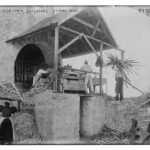 England appropriated the island of Barbados in 1625, continuing to control it until 1962. Over the course of the previous century, its inhabitants had either been kidnapped and enslaved or driven out by the Portuguese. Working on the plantations, English and Irish serfs, enslaved Africans and American indigenous peoples were settled, exploited, tortured and murdered in the cultivation of sugar cane. They defended themselves, often together, through flight, arson, murder and revolt. In the Caribbean, as in other parts of the Americas, resilient formerly enslaved people formed what were called Maroon communities (Linebaugh & Rediker 2008).
England appropriated the island of Barbados in 1625, continuing to control it until 1962. Over the course of the previous century, its inhabitants had either been kidnapped and enslaved or driven out by the Portuguese. Working on the plantations, English and Irish serfs, enslaved Africans and American indigenous peoples were settled, exploited, tortured and murdered in the cultivation of sugar cane. They defended themselves, often together, through flight, arson, murder and revolt. In the Caribbean, as in other parts of the Americas, resilient formerly enslaved people formed what were called Maroon communities (Linebaugh & Rediker 2008).
.
Further Reading:
*Peter Linebaugh & Marcus Rediker (2000): The Many-headed Hydra. New York: Verso.
OK
Queen Mary, ah where you gon’ go burn? Queen Mary, ah where you gon’ go burn? Don’ ask me nothin’ t’all. Just geh me de match an oil. Bassin Jailhouse, ah deh de money dey.
Correct!
Queen Mary, ah where you gon’ go burn? Queen Mary, ah where you gon’ go burn? Don’ ask me nothin’ t’all. Just geh me de match an oil. Bassin Jailhouse, ah deh de money dey.
Year:
Author Bio:
From a song about Mary Thomas (approx. 1848-1905) who was called Queen Mary. She was one of the three black women leaders of workers’ protests in the Virgin Islands, then a Danish colony.
Source:
Quote: Jeannette Allis Bastian (2003): Owning Memory: How a Caribbean Community Lost its Archives and Found its History. London: Libraries Unlimited,, p. 12.
Picture: Wikimedia
Context:
 Although slavery was abolished in 1848, working conditions barely improved. In 1878, Queen Agnes, Queen Mathilda and Queen Mary organised the Fireburn Protests. These were the largest workers’ protests to date in Danish history (The Workers Museum, 2018: Fireburn). They were the largest in terms of participation, the destruction of infrastructure and, above all, loss of life – especially on the side of the rebels (conversation between glokal and Gunvor Simonsen, University of Copenhagen, 2020). The memories of the three Queens are kept alive through statues on the islands and in Denmark, and through songs and theatre performances.
Although slavery was abolished in 1848, working conditions barely improved. In 1878, Queen Agnes, Queen Mathilda and Queen Mary organised the Fireburn Protests. These were the largest workers’ protests to date in Danish history (The Workers Museum, 2018: Fireburn). They were the largest in terms of participation, the destruction of infrastructure and, above all, loss of life – especially on the side of the rebels (conversation between glokal and Gunvor Simonsen, University of Copenhagen, 2020). The memories of the three Queens are kept alive through statues on the islands and in Denmark, and through songs and theatre performances.
Further Reading:
*Gunvor Simonsen (2017): Slave Stories: Law, Representation, and Gender in the Danish West Indies. Aarhus: Aarhus Universitetsforlag.
*Jeannette Allis Bastian (2003): Owning Memory: How a Caribbean Community Lost Its Archives and Found Its History. London: Libraries Unlimited.
OK
1500
to 1600
to 1700
to 1800
to 1850
to 1900
to 1925
to 1950
to 1975
to 1990
to 2000
to 2010
2011